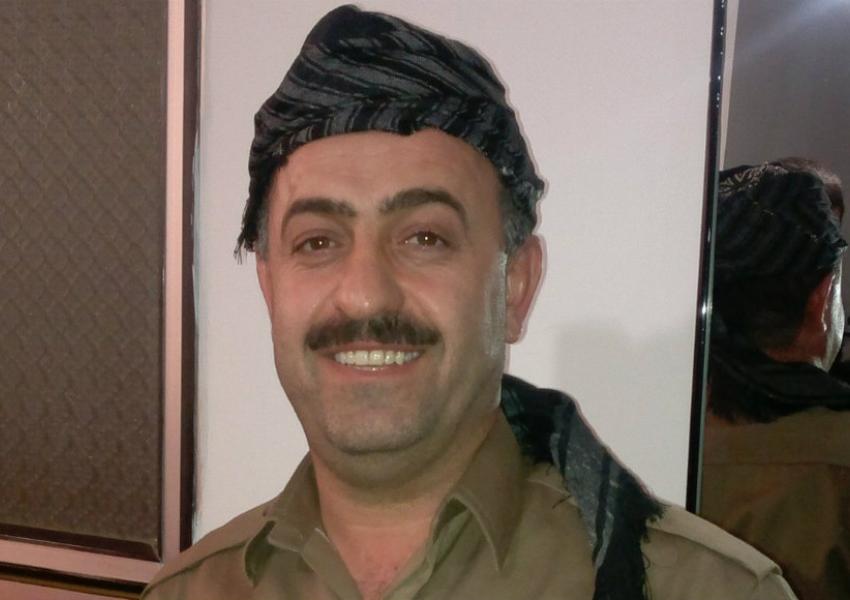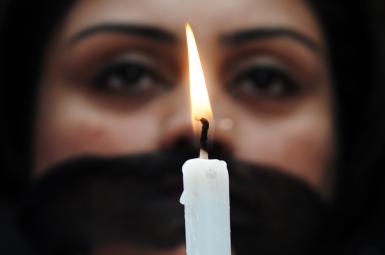
Cellmate Says Death-Row Kurd Was Tortured For Murder Confession
In an audio file, Ebrahim Yusefi, a former cellmate of Kurdish prisoner Heidar Ghorbani, who faces execution, has claimed Ghorbani was tortured to confess to involvement in the deaths of three members of the Basij militia in 2016 in Kurdistan province.
In the audio file released on a Twitter account Sunday, Yusefi said he was held with Ghorbani, now 48, in Kamyaran prison in early 2017 and saw evidence of his cellmate having undergone torture including bruises on wrists and hips. "He had shouted so much under torture, including being hung from the ceiling, that his throat was scratched and infected," Yousefi said.
Yousefi insisted that Ghorbani had denied any involvement in the killings and that a televised confession was extracted under torture. Before Ghorbani went on trial in March 2017, the English-language state television channel Press TV had broadcast a video, “The Driver of Death,” in which Ghorbani confessed to involvement in the killings.
Ghorbani was sentenced to death in 2019 by the Revolutionary Court of Sanandaj, the provincial capital, for “armed rebellion against the state,” involvement in the three murders, and extortion. According to Amnesty, Ghorbani “was also tried before Branch 1 of Criminal Court 1 of Kurdistan province for aiding and abetting murder, attempted kidnapping, assisting the direct perpetrators to escape,” for which “he was sentenced to a total of 118 years and six months and 200 lashes on 6 October 2019.” The death sentence has been confirmed by the Supreme Court.
Ghorbani’s attorney, Saleh Nikbakht, Friday told the United States’ government’s Voice of America that no evidence of his being armed or using arms was provided in the trial and that the conviction had been based on confessions. The three killings appear to have taken place in clashes between Iranian security forces, including the Basij, and guerrillas of the Kurdistan Democratic Party of Iran, which is committed to Kurdish autonomy and based in northern Iraq.
In a statement in September 2020, Amnesty International said Ghorbani was sentenced despite the court confirming he was not armed. Amnesty has argued that under Iranian law the crime of “armed rebellion against the state” requires that anyone found guilty must be a member of an armed group and personally have resorted to arms.
"His conviction is based on torture-tainted ‘confessions’, obtained while he was forcibly disappeared," Amnesty said, referring to three months after his arrest in October 2016 when, Amnesty said, he was unable to contact his family or a lawyer. Amnesty urged the Iranian authorities to quash his sentence and grant him a retrial.
Borzan Mohammadi, a Kurd serving a sentence at Marivan prison, Kurdistan province, in a letter published by the Human Rights News Agency (HRANA) Sunday, described physical and psychological torture he had witnessed. He named several victims including Vafa Vatandoust, serving a 15-year sentence in Marivan prison for membership of an illegal Kurdish party. According to Mohammadi, Vatandoust, an almost illiterate cross-border porter (kolbar) who cannot speak Persian, had been stripped and tortured for months to confess.
"Most political prisoners are subjected to various forms of abuse and torture in prisons across the country or are deprived of family visits and telephone calls. Sometimes families of prisoners are also treated with violence," Mohammadi wrote in his letter.
Many other political prisoners, including 27-year-old wrestler Navid Afkari who was executed in September 2020, and prisoners of conscience such as Behnam Mahjoubi who died in hospital, have claimed that they were tortured physically and psychologically or were deprived of proper medical care. Many also claim their confessions, which are often shown on the state-run television (IRIB), were extracted under intense physical and psychological torture.
Iran's Judiciary officials have always denied any kind of torture and forced confessions. Following the recent publication of leaked footage of prisoner abuse by hackers, some officials, Iranian Judiciary's First Deputy Mohammad Mosaddegh, have denied allegations of torture and prisoner abuse and claimed that the scenes seen in the videos were " taken from places other than prisons and assembled" by hackers.




